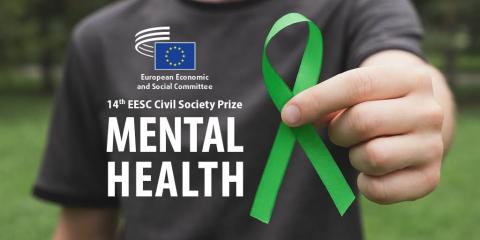European Economic
and Social Committee
14th EESC Civil Society Prize
Five organisations are awarded the 14th EESC Civil Society Prize
The EESC is pleased to announce the five winners of the 14th edition of the Civil Society Prize, which rewards initiatives aimed to support people with mental health conditions and promote an environment fostering mental well-being on an individual or collective basis.
An evaluation panel composed of ten experts chose the winners from over one hundred projects from across Europe and beyond.
The prize awards ceremony took place on 7 March 2024 during the EESC Civil Society Week.
The first prize, of a value of 14.000 EUR, went to AgeWell – a project by the Third Age Foundation (Ireland)
‘AgeWell’ is a social engagement network that improves well-being among the elderly. Using a combination of in-house visits and a smartphone application, it offers companionship and emotional support to those who lack them and identifies health risks at an early stage. Monitoring the elderly in need are older volunteers, who in this way enrich their own lives as well as those of others.
The other prizes, of a value of 9.000 EUR each, went to:
2nd prize: Lapinlahden Lähde – a community centre run by the Pro Lapinlahti association (Finland)
‘Lapinlahden Lähde’, or ‘The Spring of Lapinlahti’ is a citizen-led community centre which offers everyone, and especially people with mental health difficulties, a nurturing and inclusive environment to heal and enjoy nature and culture. Built through the renovation of Helsinki’s Lapinlahti Hospital, the centre organises various workshops and events related to mental health literacy. With 50,000 visitors each year, it is now open to the public, breaking down stigma and raising awareness of mental health.
3rd prize: Crazy? So what!’ – an initiative run by Integra (Slovakia)
The initiative ‘Crazy? So what!’ by Slovak organisation Integra breaks down stereotypes by promoting a compassionate understanding of mental health among young people. A professional expert and an adult with personal experience of mental illness visit schools for a day to talk to students aged between 15 and 20 and provide first-hand insight into what it is like to have poor mental health and into the road to recovery. The programme has been positively received by students, encouraging them to talk openly about their mental health.
4th prize: The World of Recovery — games created by the Lilinkoti Foundation (Finland)
‘The World of Recovery’ consists of two games designed to support mental health. Set in a futuristic world of hope, they promote a player’s journey to recovery through goals that inspire a healthy self-image, personal autonomy, and an active and meaningful life. The first is a non-violent mobile game and the second is an award-winning table-top role-playing game. The games target mental health and substance abuse recoverers, along with professionals, and are free to use.
5th prize: Telling Stories for Good – a project by the Animenta organisation (Italy)
‘Telling Stories for Good’ is a project designed to change stereotypical narratives around eating disorders, which affect more than four million people in Italy alone, two million of whom are adolescents. Its prevention and awareness-raising programmes are carried out by volunteer professionals online and in schools across Italy and have so far reached 10 000 children. The project also provides specific help to those suffering from mental health problems and their families. Virtual online dinners, created with the help of a volunteer dietitian, also encourage young people to approach meals in a healthy way again.
The EESC thanks all candidates for their application and warmly congratulates the winners.
